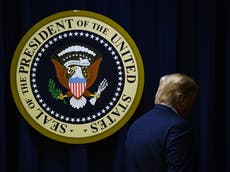How ‘lame duck’ Trump can still frustrate Biden’s ascent to power
History shows that outgoing presidents have a habit of making extensive use of their executive power of pardon, writes Sean O'Grady. What else does Trump have up his sleeve?


As the abrupt “termination” by Donald Trump of his defence secretary shows, the term “lame duck president” can be a misnomer. It is commonly used to describe a president at the end of their term of office, serving out the remainder of their time after their successor has been elected. It implies a lack of political and moral authority, given the circumstances, and the convention is that presidents on their way out don’t do anything too bold, and cooperate in a smooth transition to the next administration.
Constitutionally and legally, however, a president’s last day in office is the same as his first, in full possession of powers and prerogatives. Hence, the sacking of uncongenial members of the administration that seems to have commenced in the Trump White House, which can be reversed by a Biden administration. The same would go, with varying degrees of ease, for various other initiatives that President Trump might make in his remaining 70 or so days in office. Traditionally the president has far more room for manoeuvre in foreign and defence affairs than at home, so he might pursue further initiatives in the Middle East, for example, perhaps by extending the list of states recognising Israel.
President Trump might also make extensive use of his executive power of pardon. Again, an outgoing president is almost expected to extend the prerogative of mercy to deserving and, sometimes, undeserving cases. There is a large contingent of former associates of the Trump administration who have run into trouble with the law; and the power of pardon can extend to crimes that may have been committed by anyone, before a certain date. This could be granted, for example, to the entire Trump family and all those who have served him in whatever capacity. The president, however, cannot pardon himself; he’d need to resign and persuade either vice president Mike Pence or the incoming president that that would be a price worth paying to draw a line under the Trump years.
There are precedents for controversial pardons during a lame-duck phase of a presidency (the Nixon pardon by Gerald Ford in 1974 wasn’t made during a transition). In 2001, for example, Bill Clinton granted a pardon to the financier Marc Rich, at the time living in Switzerland and being sought by federal officers for tax evasion, sanctions busting, fraud and racketeering; Rich was also a major donor to the Democrats. On his very last day in the Oval Office, Bill Clinton also pardoned his half-brother Roger, convicted on charges of conspiracy to distribute cocaine. George HW Bush took the opportunity to give lame-duck pardons to various figures involved in the Iran-Contra affair on Christmas Eve 1992. By contrast, Richard Nixon did not do the same for White House staff after Watergate. Such pardons cannot be rescinded by a successor or the courts, though they have been challenged and can be investigated.
So Donald Trump can still do much to further his interests and his agenda in the coming weeks, and is under no legal obligation to ease Joe Biden’s assumption of power in January. That will no doubt hamper the early progress of the next government, but other countries have an even more sudden clean break after a general election, though a fully independent civil service makes things easier in the upper echelons of public administration. It has to be noted too that members of the new Biden administration might take Trump’s recent behaviour into account when dealing with their irascible predecessor.


Join our commenting forum
Join thought-provoking conversations, follow other Independent readers and see their replies
Comments